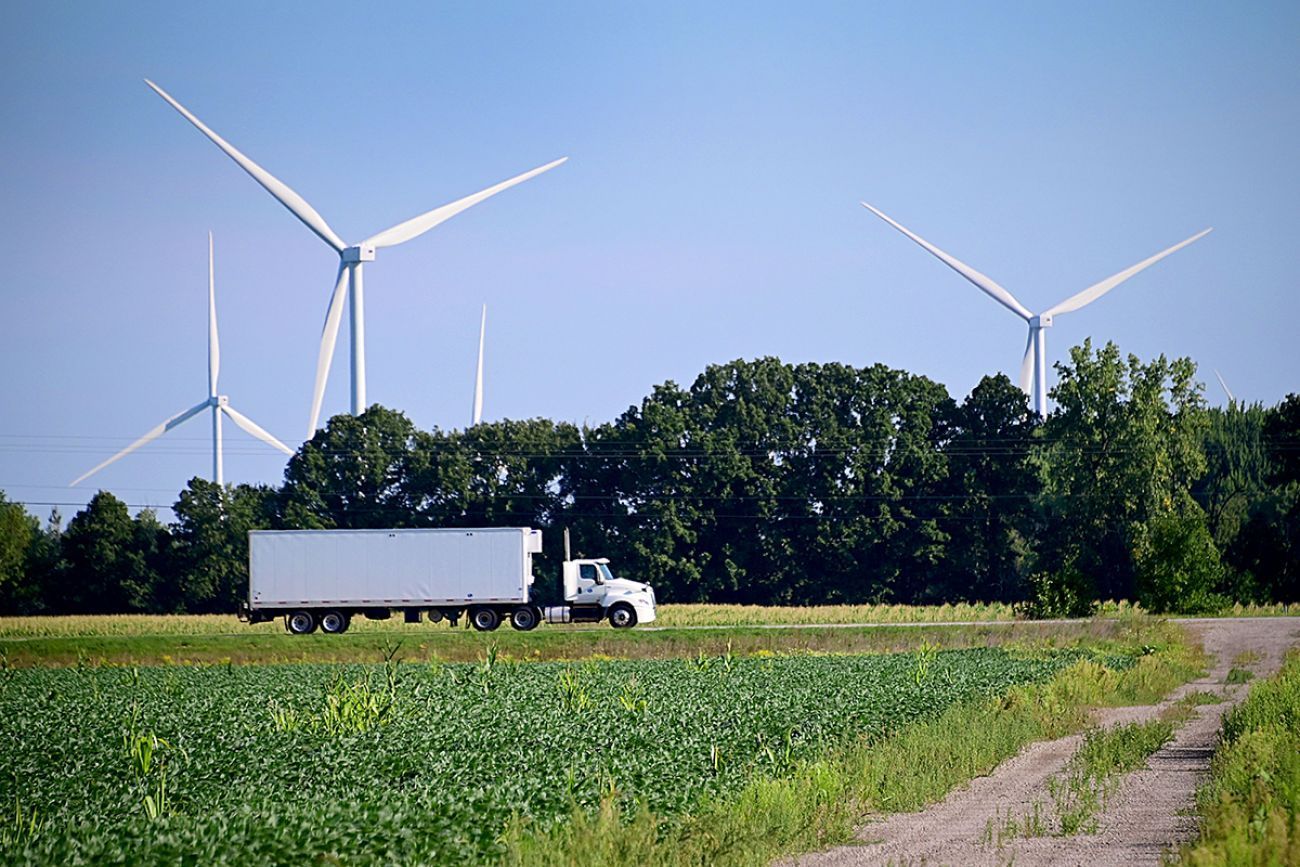Michigan Senate votes to override local decisions on wind, solar energy

- The Senate Wednesday approved bills to shift permitting authority over wind, solar developments to the state
- The bills are expected to gain Gov. Gretchen Whitmer’s signature
- The effort comes in response to local pushback against wind and solar developments that have slowed Michigan’s transition to green energy
Michigan lawmakers approved another major change to the state’s energy policy on Wednesday, passing a two-bill package that would let state regulators override local decisions about where to allow large-scale wind and solar arrays.
The bills, which pitted environmentalists against local government advocates, passed narrowly along party lines, 20 to 18, with unanimous support from the Senate Democratic majority. The measures will soon head to Gov. Gretchen Whitmer’s desk, where she is expected to sign them.
“We are setting an example for the rest of the nation on how to navigate the deeply complex realm of energy policy in a way that promotes affordability and reliability, drives job creation and honors the role we must play in mitigating climate change,” Senate Majority Leader Winnie Brinks, D-Grand Rapids, said just before the vote.
Related:
- Michigan House passes climate change reform, mandating clean energy by 2040
- Proposed state oversight of solar, wind pits energy needs v. rural rights
- Wind wars: Wind turbines put green energy on the ballot in Michigan
Proponents call the measures essential to another controversial policy the Legislature passed this week: A requirement for utilities to deliver 100 percent clean energy by 2040.
But opponents fear that restricting local governments’ ability to block renewable energy projects will leave some rural communities overrun with wind and solar arrays.
“So many of you constantly, persistently tell everyone how much you love the U.P. or other rural Michigan areas,” said Sen. Ed McBroom, R-Vulcan. “Yet the very things that make you appreciate the economy, culture, natural and picturesque landscapes … will be stripped away.”
The state’s two largest utilities, DTE Energy and Consumers Energy, have vowed to become net-zero by midcentury. But Dan Scripps, chair of the Michigan Public Service Commission, which regulates DTE and Consumers, said the companies are struggling to stay on track as local opposition scuttles wind and solar projects.
“Its difficult to see how we meet these commitments or our broader renewable energy goals without meaningful siting reform,” Scripps said Tuesday during a Senate committee hearing on the bills.
The permitting reform package, House Bills 5120 and 5121, is part of a massive energy policy rewrite that aims to speedily wean the state off fossil fuels. To do so, Michigan utilities must build out power sources that don’t emit greenhouse gasses, such as wind, solar and nuclear.
To meet the energy standard that Whitmer is expected to sign into law in the coming days, Michigan needs up to 209,000 acres of wind and solar developments in addition to those already built or in the works, Scripps said.
“That’s a big number,” he said, “But in context, it represents about 0.55 percent of Michigan's total area.”
Republican representatives accused Scripps of downplaying the bills’ impact on rural areas, which will host most of that acreage because large projects require vast open spaces.
McBroom, an Upper Peninsula dairy farmer, said he fears a “mass loss of valuable farmland.”
Without the new legislation, utilities have needed the blessing of local governments to build large wind and solar developments. But from Montcalm County to the Thumb, fights over these efforts have pitted neighbors against neighbors, leading to recall votes and canceled projects.
If Whitmer approves the changes, the Michigan Public Service Commission will have ultimate permitting authority. The bills also set criteria governing how much noise and light the projects can emit, how far they must be from neighboring buildings, and other particulars.
Neighbors who oppose rural renewable energy developments say they fear losing tillable land and property values as idyllic views are replaced with vast solar fields and towering turbines. Local government advocates say the bills are an affront to Michigan’s long tradition of local control over land use.
“These bills are not about whether or not we need clean energy in Michigan,” said Judy Allen, director of government relations for the Michigan Townships Association. “This is about who is best equipped to make those decisions.”
But farmers looking to host renewable energy on their property say local governments are violating their private property rights by restricting wind and solar developments.
Dave Farnsworth, a Montcalm county farmer whose family signed a wind lease on its property, said the income from such leases can keep struggling farms afloat.
“Opponents say they don’t want wind and solar projects because it would disturb the rural nature of their environment,” Farnsworth said. “The irony is, if they stop the projects, property owners like us will be forced to make some hard decisions between keeping it as a farm or selling it off for development.”
The bills would allow local governments to keep permitting authority if they pass their own ordinance complying with the state’s requirements. But developers could bypass the local permitting process if a community lacks an approved ordinance, takes too long to review a proposal, or rejects a proposal that complies with state standards.
That prompted a sarcastic response from Sen. John Damoose, R-Harbor Springs, as he questioned Scripps during a committee hearing Tuesday.
“So basically as long as we say yes, you don’t get involved,” Damoose said.
Environmentalists, trade unions, and some industry groups support the bills. They argue that in a worsening climate crisis, Michigan doesn’t have time to spare on prolonged local battles over renewable energy development.
Global climate scientists have estimated that society must stop adding greenhouse gasses to the atmosphere by midcentury, or accept catastrophic consequences from rising seas, worsening storms, droughts, wildfires and famines.
“Building out the infrastructure to provide clean, healthy forms of energy like solar and wind is essential to protecting the health of all Michigan residents,” Elizabeth Del Buono, executive director of Michigan Clinicians for Climate Action, said in a statement.
The bills join a flurry of legislation that Democrats rushed to pass this week, before they temporarily lose their narrow House majority. Democratic Reps. Kevin Coleman and Lori Stone are departing the legislature after successful mayoral bids, and it will take months to elect their replacements.
In addition to the renewable permitting bills and the 2040 clean energy standard, other energy reforms passed this fall and awaiting Whitmer’s signature include:
- Senate Bill 273, which would require utilities to boost their energy-efficiency savings from 1 percent to 1.5 percent.
- Senate Bill 502 to expand the Michigan Public Service Commission’s authority to prioritize a host of new goals in its decision making, from climate to energy affordability and reliability.
- Senate Bill 519 to create an office in the Department of Labor and Economic Opportunity that would help retrain automotive and energy workers whose jobs could be replaced amid the shift to electric vehicles and renewable energy.
- Senate Bill 277 to codify an existing state rule allowing farmers to rent their land for solar arrays while staying enrolled in the state’s farmland preservation program.
The energy rewrite divided Michigan’s environmental movement, with mainstream environmental groups largely supporting the outcome while environmental justice groups argued the 2040 deadline is too slow, and that other concessions made by lawmakers will harm poor and minority communities.
Michigan Environment Watch
Michigan Environment Watch examines how public policy, industry, and other factors interact with the state’s trove of natural resources.
- See full coverage
- Subscribe
- Share tips and questions with Bridge environment reporter Kelly House
Michigan Environment Watch is made possible by generous financial support from:
Our generous Environment Watch underwriters encourage Bridge Michigan readers to also support civic journalism by becoming Bridge members. Please consider joining today.
See what new members are saying about why they donated to Bridge Michigan:
- “In order for this information to be accurate and unbiased it must be underwritten by its readers, not by special interests.” - Larry S.
- “Not many other media sources report on the topics Bridge does.” - Susan B.
- “Your journalism is outstanding and rare these days.” - Mark S.
If you want to ensure the future of nonpartisan, nonprofit Michigan journalism, please become a member today. You, too, will be asked why you donated and maybe we'll feature your quote next time!






